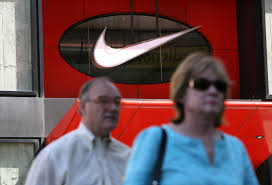Don’t Blame Kaepernick, But Nike Stock Dropped 4% After Its Earnings Report Was Released

Nike’s stock tumbled more than 4% late Tuesday after the company reported earnings that were slightly better than analyst forecasts.
While critics of the apparel giant’s endorsement of Colin Kaepernick might be tempted to believe the backlash to the controversial ad campaign is to blame for the post-earnings selloff, there is reason to believe that bearish investors had other things on their minds.
Nike’s revenue in its fiscal first quarter ended Aug. 31 rose 10% to $ 9.95 billion, which was $ 10 million above the consensus forecast among Wall Street analysts. It posted earnings of 67 cents a share in the quarter, beating the Wall Street figure by four cents. All in all, it was a strong quarter, if not a blowout one, yet investors reacted as if the company had bad news to report.
Nike waded boldly into a national debate that has rocked NFL football since 2016, when Kaepernick, then a quarterback for the San Francisco 49ers, took a knee during the national anthem to protest recent killings by police of African Americans and other manifestations of racial injustice in the U.S. Donald Trump has kept the debate alive since then.
Nike was largely silent on the debate until Sept. 4, when the company signed an endorsement deal with Kaepernick and other athletes, prompting many Trump supporters to scissor the swooshes from their Nike socks. But Nike’s earnings Tuesday were for a quarter that ended in August, so any effect, positive or negative, on its revenue won’t be apparent for another few months.
So what caused investors to sell off Nike? There are three likely factors. One is that Nike’s stock, which has risen 6% since it announced the Kaepernick endorsement, has set a series of record highs this month, adding as much as $ 6 billion to its market cap. The rally left Nike expensive: As of Tuesday’s close, Nike traded at 72 times its recent earnings.
Nike also has a stellar track record of beating analyst estimates. According to research firm Bespoke, Nike has now beaten analyst forecasts for 25 straight quarters. The last time Nike missed its numbers was in June 2012, a few months before Kaepernick scored his first career touchdown. The flip side of that impressive feat is that investors have come to expect Nike to beat earnings. A merely so-so quarter can seem like a relative disappointment.
Then there were the few worrisome notes in Nike’s otherwise strong quarter. The company’s gross margins of 44% were lower than some analysts had been expecting, which could signal a rise in production costs for the company. Sales in Europe, Asia and Latin America, which together make up 58% of Nike’s revenue, were also mixed. But these markets aren’t focussed on the NFL controversies at the forefront of U.S. sports headlines.
Neither are investors, at least for now. But there are indications that, if anything, the Kaepernick ad campaign revived the Nike brand for younger consumers, leading to an overall increase in sales during September. If that keeps up, Nike could continue its streak of beating Wall Street’s forecasts for its financial performance.


